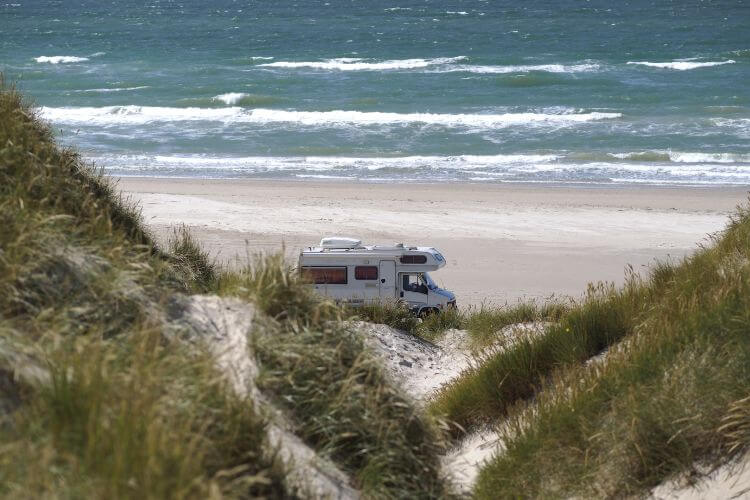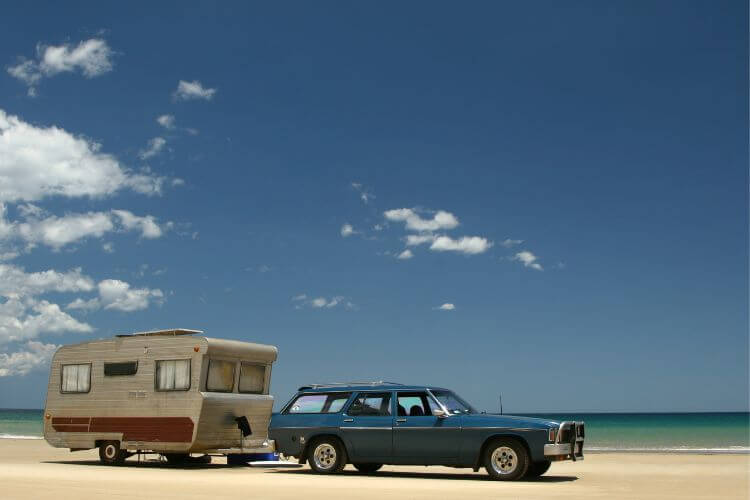Parking a caravan on the beach may seem like a dream come true for many holidaymakers. However, the legality of doing so is a topic that is often debated.
The answer to whether or not you can park a caravan on the beach depends on a variety of factors, including the location, local bylaws, and environmental regulations.
In the UK, there are a number of caravan parks located near the beach, which offer a range of facilities and amenities for holidaymakers. These parks provide a safe and secure environment for families to enjoy their holiday, with easy access to the beach and other local attractions.
Many of these parks offer a range of accommodation options, including static caravans, touring caravans, and camping pitches.
While it may be tempting to park your caravan on the beach, it is important to check the local regulations before doing so. In some areas, it may be illegal to park on the beach, and you could be fined or even have your caravan towed away.
It is always best to check with the local council or beach authority before parking your caravan on the beach, to ensure that you are not breaking any rules or regulations.
The Law on Parking Caravans on Beaches

Restrictions on Parking Caravans on Beaches
Parking a caravan on a beach is not allowed in most cases. Local authorities enforce restrictions on parking caravans on beaches to preserve the natural environment and protect public safety. Caravans can damage the beach and pose a risk to pedestrians and other beachgoers.
In the UK, it is illegal to park a caravan on a beach without permission from the landowner or local council. Caravans are not allowed on most beaches, and those that do allow caravans usually have strict rules in place.
These rules may include restrictions on the size and type of caravan allowed, the duration of stay, and the areas where caravans can park.
Penalties for Parking Caravans on Beaches
Penalties for parking caravans on beaches without permission can be severe. Local councils can issue fines, impound caravans, and even take legal action against offenders. The fines for parking a caravan on a beach can vary depending on the location and the severity of the offence.
In addition to fines, parking a caravan on a beach without permission can result in damage to the environment and public safety. Caravans can cause erosion, damage wildlife habitats, and create hazards for pedestrians and other beachgoers.
Therefore, it is important to check the rules and regulations before parking a caravan on a beach. It is always better to seek permission from the local council or landowner before parking a caravan on a beach to avoid any legal or environmental consequences.
Factors to Consider Before Parking a Caravan on the Beach

Environmental Impact of Parking a Caravan on the Beach
Parking a caravan on the beach can have a significant impact on the environment. The weight of the caravan can damage the sand and vegetation, and waste from the caravan can pollute the beach and harm wildlife.
Before parking a caravan on the beach, it’s important to consider the impact it may have on the environment and take steps to minimize it.
Some ways to minimize the environmental impact of parking a caravan on the beach include:
- Choosing a location that is already heavily used by vehicles to minimize damage to vegetation and sand
- Using biodegradable cleaning products and disposing of waste properly
- Not driving or parking on dunes or other sensitive areas
Safety Concerns of Parking a Caravan on the Beach
Parking a caravan on the beach can also pose safety concerns. The beach environment can be unpredictable, with changing tides, weather conditions, and other hazards. Before parking a caravan on the beach, it’s important to consider the safety risks and take steps to mitigate them.
Some ways to stay safe when parking a caravan on the beach include:
- Checking weather and tide conditions before parking on the beach
- Ensuring the caravan is parked on a level surface to prevent it from tipping over
- Using stabilizing equipment to prevent the caravan from moving or shifting
Accessibility and Facilities on the Beach
When parking a caravan on the beach, it’s important to consider accessibility and the availability of facilities. Some beaches may have limited access or facilities, which can make it difficult to park and stay in a caravan.
Before parking a caravan on the beach, it’s important to research the area and ensure that it has the necessary facilities and access.
Some factors to consider when assessing accessibility and facilities on the beach include:
- Access to water, electricity, and waste disposal facilities
- Availability of public restrooms and showers
- Accessibility for people with disabilities or mobility issues
Alternatives to Parking a Caravan on the Beach
Campsites and Caravan Parks
One alternative to parking a caravan on the beach is to stay at a campsite or caravan park. These sites offer a range of facilities and amenities, such as electricity hook-ups, water points, and waste disposal facilities.
Many of these sites are situated in scenic locations, such as national parks or near the coast, so you can still enjoy the great outdoors without the risks associated with parking on the beach.
When choosing a campsite or caravan park, it is important to consider the facilities and services on offer, as well as the location and cost. Some sites may have restrictions on the size or type of caravan that can be accommodated, so it is important to check before you book.
Private Land
Another option is to park your caravan on private land with the owner’s permission. This could be a friend or family member’s property, or a commercial site that offers caravan storage.
Private land can offer a secure and convenient location for your caravan, and may also provide access to facilities such as electricity and water. When parking on private land, it is important to obtain the owner’s permission and to ensure that you comply with any local regulations or bylaws.
You should also consider the security of the site, and take steps to protect your caravan from theft or damage. Overall, there are a number of alternatives to parking a caravan on the beach, each with its own advantages and disadvantages.
By considering your needs and preferences, and researching your options carefully, you can find the best solution for your next caravan adventure.
Conclusion
Caravanning on the beach can be an exciting and unique experience for those who love the outdoors. However, it is important to keep in mind that not all beaches allow caravanning, and those that do may have restrictions and regulations in place.
Before embarking on a beach caravanning trip, it is essential to research the specific beach’s rules and regulations. This includes checking for any permits, fees, and restrictions on the size of the caravan or the length of stay.
It is also important to consider the environmental impact of caravanning on the beach and to take steps to minimise any negative effects.
While some beaches may offer basic facilities such as toilets and showers, it is important to be prepared for self-sufficiency. This includes bringing enough food, water, and supplies for the duration of the trip.
It is also important to properly dispose of any waste and to leave the beach in the same condition as it was found.
Overall, caravanning on the beach can be a rewarding experience for those who are properly prepared and follow the rules and regulations in place. With the right planning and a respect for the environment, caravanning on the beach can be a unique and enjoyable way to experience the great outdoors.



